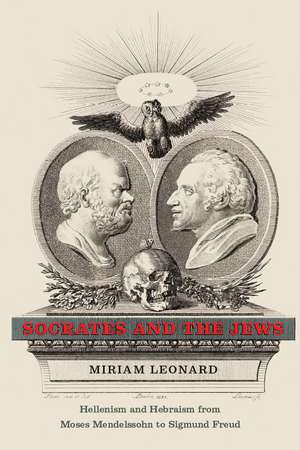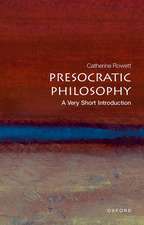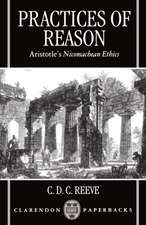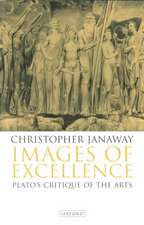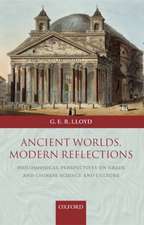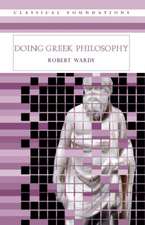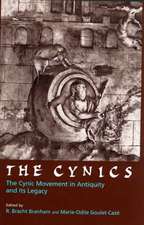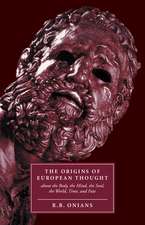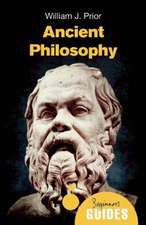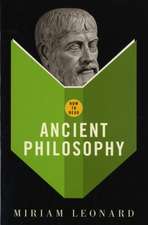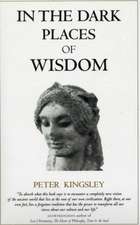Socrates and the Jews: Hellenism and Hebraism from Moses Mendelssohn to Sigmund Freud
Autor Miriam Leonarden Limba Engleză Paperback – 24 oct 2014
Exploring the tension between Hebraism and Hellenism, Miriam Leonard gracefully probes the philosophical tradition behind the development of classical philology and considers how the conflict became a preoccupation for the leading thinkers of modernity, including Matthew Arnold, Moses Mendelssohn, Kant, Marx, Nietzsche, and Freud. For each, she shows how the contrast between classical and biblical traditions is central to writings about rationalism, political subjectivity, and progress. Illustrating how the encounter between Athens and Jerusalem became a lightning rod for intellectual concerns, this book is a sophisticated addition to the history of ideas.
Preț: 251.70 lei
Nou
Puncte Express: 378
Preț estimativ în valută:
48.16€ • 50.42$ • 39.85£
48.16€ • 50.42$ • 39.85£
Carte tipărită la comandă
Livrare economică 07-21 aprilie
Preluare comenzi: 021 569.72.76
Specificații
ISBN-13: 9780226213347
ISBN-10: 022621334X
Pagini: 264
Ilustrații: 6 halftones
Dimensiuni: 152 x 229 x 23 mm
Greutate: 0.37 kg
Editura: University of Chicago Press
Colecția University of Chicago Press
ISBN-10: 022621334X
Pagini: 264
Ilustrații: 6 halftones
Dimensiuni: 152 x 229 x 23 mm
Greutate: 0.37 kg
Editura: University of Chicago Press
Colecția University of Chicago Press
Notă biografică
Miriam Leonard is professor of Greek literature and its reception at University College London. She is the author of Athens in Parisand How to Read Ancient Philosophy.
Cuprins
List of Figures
Note on Translations
Acknowledgments
Introduction: Athens and Jerusalem
Note on Translations
Acknowledgments
Introduction: Athens and Jerusalem
1. Socrates and the Reason of Judaism: Moses Mendelssohn and Immanuel Kant
Socrates and the Age of Enlightenment
Mendelssohn’s Phaedo
Religion within the Limits of Reason Alone
Mendelssohn and the French Revolution
2. Noah and Noesis: Greeks, Jews, and the Hegelian Dialectic
Socrates and Christ, Kant and Hegel
Noah and Deucalion
Abraham and the Greek Republics
The Tragedy of Judaism
3. Matthew Arnold in Zion: Hebrews, Hellenes, Aryans, and Semites
History, Language, Culture
Arnold: Between Psychomachy and Physiology
The Philological Laboratory and the Jewish Question
4. Greeks, Jews, and the Death of God: Feuerbach, Marx, Nietzsche
Greek Nature and Jewish Appetites: Ludwig Feuerbach’s The Essence of Christianity
Prometheus and the Pentateuch: Karl Marx ”On the Jewish Question”
“Dionysus against the Crucified”: Nietzsche’s Genealogy of Christianity
5. Moses on the Acropolis: Sigmund Freud
The Disturbance of Philology
The Life of Moses
The Triumph of Geistigkeit
Between Hannibal and Winckelmann
Epilogue: “Metaphors we live by ... ”
Works Cited
Index
Recenzii
“Socrates and the Jews is a triumph of critical scholarship. With this book, Leonard throws new light on the troubled inheritance of the Enlightenment, which bequeathed to modernity a series of ways of working through its own contorted rupture from the past. No one who reads this study will ever again be able to think of the category ‘Greek’—that prototype and anti-type of modernity—without simultaneously calling to mind its inextricable but neglected congener, ‘Jew.’ Leonard convincingly demonstrates how these notions, paired together, have served as problematic and contested sites, both imaginary and real, in the emerging and evolving conceptions of race, nation, culture, and modernity in European thought, from Moses Mendelsohn, the ‘Jewish Socrates,’ to Sigmund Freud, who could recast Moses as either quasi-Greek or Egyptian. The intervening chapters on Kant, Hegel, Arnold, and Marx are as illuminating as they are disturbing to read.”
“In Socrates and the Jews,Leonard compellingly retraces the mutual imbrications of Greek-Jew figurations and post-Enlightenment philosophical and political discourses, resulting in an extraordinarily rich and multilayered book that is at once intellectual history, reception study, and philosophical-cum-philological inquiry. Leonard’s mastery of the myriad literatures she engages is stunning. A remarkable achievement.”
“Modernity as the site of our present predicament demands to be thought and rethought. The question is how? The argument of Miriam Leonard’s profound and important book is that central to that project has to be an understanding of the way the opposition between Athens and Jerusalem works to structure the ways modernity has been thought and continues to be thought. Her book makes it clear that terms such as ‘secularism,’ ‘Christianity,’ ‘philosophy,’ even ‘Judaism’ demand reconsideration. What drives that demand is the complex set of interrelationships that are already there constructing the presence of the modern, a presence which once analyzed indicates the naivety of the assumption that modernity occurs at the end of religion. Recalling and working through the opposition between Athens and Jerusalem works beyond the disavowal of religion in the name of an affirmation of the Enlightenment by noting their already present imbrication. Leonard’s book demands urgent consideration by anyone interested in understanding the quality of the ‘day’ in which thinking today has to occur.”
“A brief review can only testify to the richness of Leonard’s readings of her primary sources and the book’s many surprises and insights, all based on a profound grasp of the vast secondary literature. . . . Highly recommended.”
"A thought-provoking, extremely well-argued demystification on two fronts. . . . She offers lucid readings of texts that enjoy a reputation among classicists as being important yet-very-hard-to-read, which means they are in fact not much read at all. But she also shows that those texts have thoroughly shaped our work as classical scholars, our assumptions, questions, and our own disciplinary framework--an insight possibly even more uncomfortable to confront than the conclusion that Athens and Jerusalem have been a staple of our political thinking. . . . This is an important book, deserving a large and serious readership."
